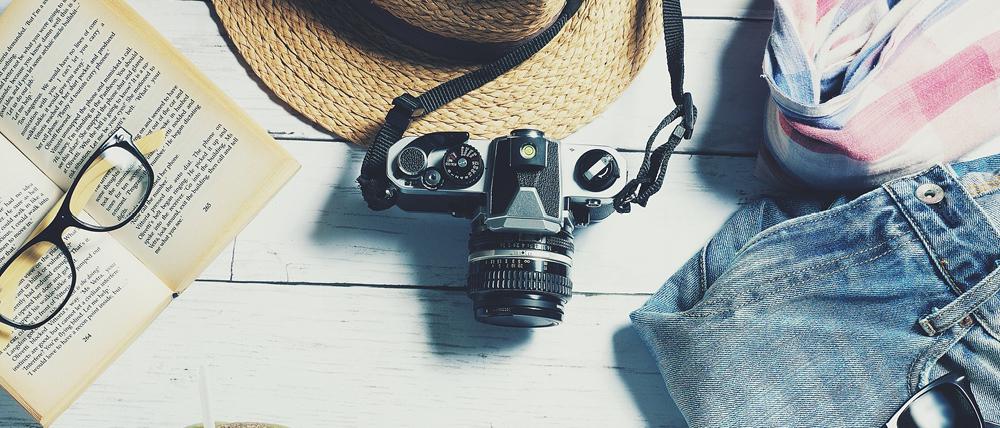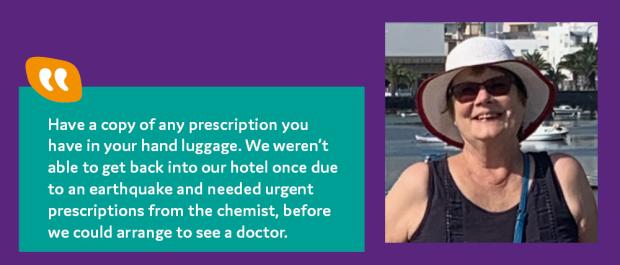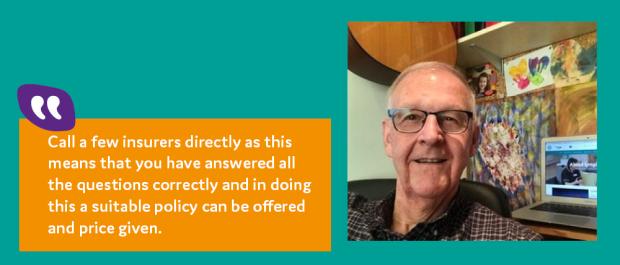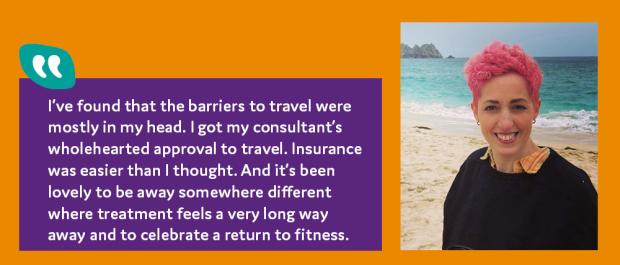Top tips for travel
If you are planning to travel or go on holiday, and are affected by lymphoma, there may be some some additional things to consider.
We asked members of our Facebook group for their 'top tips' and suggestions for travel and holidays. Here is what they told us.

Planning your trip
- Talk to your specialist or CNS if you are unsure whether it is safe for you to travel (this could be around planned treatment or considering if your immune system is lowered). Your travel insurance company may need a letter from your healthcare professional to confirm this.
- It is a good idea to research your destination. Are there medical facilities or a hospital nearby if you need them? How will you be travelling - is there public transport? What is the terrain like - is the area hilly or flat (as this might be important if you get fatigued)?
- You might like to write a check list of all the things really necessary for your trip (such as your passport, travel tickets, travel insurance information, parking instructions) in advance. Then you can check them off on the day you travel just before you go.
Medication and medical information
- It can be helpful to take a copy of your hospital letter with your diagnosis, and your most recent follow-up letter. It can also be useful to have a list of any treatment you have had and medications you are on. This can be helpful if you need to explaining your condition.
- If you are prone to infections, consider talking to your medical team about supplies of antibiotics or any other medication that it might be helpful to take with you.
- Some countries may require you to take medication in its original packaging (rather than just strips of pills or a pill or dosette box). It is often worth checking the situation in your destination country well before you travel.
- Check what travel vaccinations you need for the country you are going to. Some vaccinations need to be given well before travel, so seek advice at least 8 weeks before your trip. It is also a good idea to talk to your medical team about your childhood inoculations (as some treatment may mean that they are no longer effective).

Insurance and GHICs
- It is important to have the right travel insurance for your trip. This can be a challenge to arrange, and it may be worth speaking to a number of companies to ensure you get the right cover for you and your situation (it is also helpful to read the inclusions and exclusions to any policy). Read more about travel insurance. You can also talk to our helpline about travel insurance companies.
- Apply for a GHIC (Global Health Insurance Card - which replaces the EHIC). This is not a replacement for travel insurance, but allows you to access 'medically necessary state-provided healthcare' if you are visiting an EU country or Switzerland. (Find out more on the NHS website).

Travelling and packing
- It can be a good idea to have paper photocopies (not just pictures on your phone) of key documents (such as your passport, driving licence, GHIC card) just in case you lose your originals, and keep these copies in separate places (not with the originals!)
- Keep a record of any key information - such as a card registry service, or the serial numbers for your mobile, camera etc. This can be helpful if you lose any items and need to make an insurance claim.
- Consider having some cash or a credit card that you keep separately from your other money - again, just in case!
- If you are taking medication, pack some extra. You could split it between your flight and hand luggage, in case any luggage is lost. You might need to take a medical letter explaining why you have this medication, particularly if you have any of it by injection.
- If you are travelling with your partner or family, consider cross-packing: splitting your clothes between the different suitcases (so that you each have clothes for both/all of you). This is helpful if a suitcase goes astray. You could also take a photo of your luggage - to make it easier to claim any lost luggage.
- Consider packing enough clothes for a day or two, and anything that you can't manage without (such as skincare, sunscreen, toothbrush), in your cabin luggage. Just in case your main suitcase goes astray. Remember to check the rules about luggage weights, and items you need to keep in a clear sealable bag, with your particular travel/airline company.
- You may want to take face coverings, antiseptic wipes and hand sanitiser with you. Having some in your hand luggage means that you can wipe armrests or tray tables if you are on a train or plane if you are concerned.
- Remember to keep hydrated while you are travelling and during your trip. Check whether it is recommended to use bottled rather than tap water in the country you are travelling to, and if in doubt use bottled water. If you are ordering drinks while travelling, you could consider asking the cafe or restaurant to steam your glass or cup first (flushing the glass or cup with steam or hot water to clean it).
Once you get to your destination
- Some chemotherapy and radiotherapy can leave your skin more sensitive to sunlight. It can be helpful to avoid being in the sun, wear sunscreen with an SPF of 30 or higher with both UVB and UVA protection, wear sunglasses with a UV filter, and consider wearing a wide-brimmed hat (to cover your scalp, neck and ears) and cover your skin with clothes such as long-sleeved shirts and trousers.
- Don’t underestimate how tired you are likely to feel after your journey. Allow plenty of time to recover when you get there.
- But remember, although you may need plenty of rest and relaxation, you are on holiday – enjoy yourself!

Read our information on travel
We have more information about travelling outside the UK if you have lymphoma and about travel Insurance.
This information comes from our Facebook users and online support meeting members, and is a list of suggestions from the community based on what they personally found useful and what they would like to pass on to others. This is not intended to be medical advice and is not a replacement for advice from your medical team. If you are looking for specific guidance for your own personal circumstances always consult your medical team.
